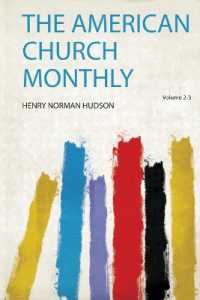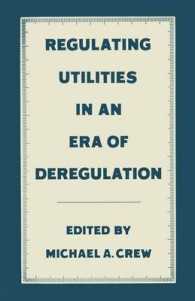- ホーム
- > 洋書
- > 英文書
- > History / World
Full Description
Recognized as one of the leading philosophers and Jewish thinkers of the twentieth century, Emil Ludwig Fackenheim has been widely praised for his boldness, originality, and profundity. As is well-known, a striking feature of Fackenheim's thought is his unwavering contention that the Holocaust brought about a radical shift in human history, so monumental and unprecedented that nothing can ever be the same again. Fackenheim regarded it as the specific duty of thinkers and scholars to assume responsibility to probe this historical event for its impact on the human future and to make its immense ramifications evident.
In Emil Fackenheim's Post-Holocaust Thought and Its Philosophical Sources, scholars consider important figures in the history of philosophy - including Kant, Hegel, Heidegger, and Strauss - and trace how Fackenheim's philosophical confrontations with each of them shaped his overall thought. This collection details which philosophers exercised the greatest influence on Fackenheim, and how he diverged from them.
Incorporating widely varying approaches, the contributors in the volume wrestle with this challenge historically, politically, and philosophically in order to illuminate the depths of Fackenheim's own thought.
Contents
Introduction
Abbreviations
1. Emil Fackenheim on Moses Maimonides and the "One Great Difference between the Medievals and the Moderns"
Benjamin Lorch, Michigan State University
2. Emil Fackenheim's Jewish Correction of Kant's Quasi-Christian Eschatology
Martin D. Yaffe, University of North Texas
3. The Meaning of History: Knowledge of Good and Evil in Hegel and Fackenheim
Paul Wilford, Boston College
4. Strategies of Jewish Hegelianism: Emil Fackenheim and Samuel Hirsch
Martin Kavka, Florida State University
5. Can Philosophy Be Positive? The Place of Schelling in the Thought of Emil Fackenheim
Jeffrey A. Bernstein, College of the Holy Cross
6. Emil Fackenheim's Way from Presence to History: Its Grounding in a Critique of Rosenzweig on Revelation
Kenneth Hart Green, University of Toronto
7. Fackenheim and Buber on Revelation: Re-evaluating the Existential and Historical Turn Away from Philosophy
Steven Kepnes, Colgate University
8. To Captivate the Jewish Thinker: Fackenheim's Ontological Encounter with Heidegger
Waller R. Newell, Carleton University
9. Philosophy in the Age of Auschwitz: Emil Fackenheim and Leo Strauss
Kenneth C. Blanchard, Jr., Northern University
10. Wiesel and Fackenheim: Philosophy and the Problem of Persecution
Sharon Portnoff, Connecticut College
Contributors
Index







